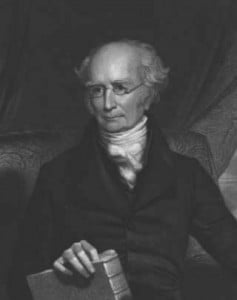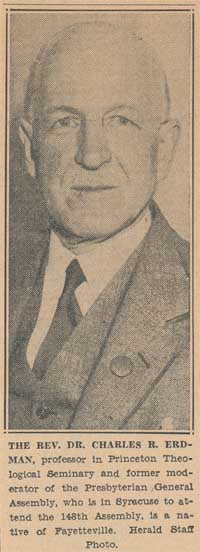A Small Church, But Faithful
Our post today draws from the Rev. Dr. George Hutchinson’s valuable work, The History Behind the Reformed Presbyterian Church, Evangelical Synod (RPCES), pp. 65-70. The RPCES was formed by a merger of the Reformed Presbyterian Church, General Synod (RPCGS) and what was the larger portion of a split of the Bible Presbyterian Church, originally named the Bible Presbyterian Church, Columbus Synod. That latter group held that name from 1956-1961, then renamed itself the Evangelical Presbyterian Church [1961-1965]. The merger of the RPCGS and the EPC then created the RPCES. [Note: In 1983, a new denomination was formed as the Evangelical Presbyterian Church and this group continues to this day, but should not be confused with the former group of the same name.]
In the preceding chapter we have seen the rise of Reformed Presbyterianism in Scotland in the seventeenth century together with its exportation to America in the eighteenth. By the first years of the nineteenth century the Reformed Presbyterian Church was firmly planted in American soil. The reconstitution of the Reformed Presbytery in 1798 under the leadership of James McKinney was followed by an outburst of optimistic energy in the Church. “Important additions were soon after made to the ministry, and the Church entered on a career of vigorous labour, crowned by a large measure of progress.‟ As a result of this energy, the official judicial testimony of the American Reformed Presbyterian Church was published in 1807 under the title Reformation Principles Exhibited. Two years later—on May 24, 1809—”All the ministers of the Reformed Presbyterian Church in America, being convened, with ruling Elders delegated from different sessions, did unanimously agree to constitute a Synod.‟ The official name was to be the Synod of the Reformed Presbyterian Church in America.
The Reformed Presbyterian Church in America was well aware of her unique circumstances and opportunities. “God has, in his Providence, presented the human family in this country with a new experiment. The Church, unheeded by the civil powers, is suffered to rise or fall by her own exertions.‟ So wrote Alexander McLeod in Reformation Princi- ples Exhibited. However, what would be the outcome of these unique circumstances? How would the Church respond to these unique opportunities? The Reformed Presbyterian Church looked upon the dawn of the nineteenth century with extreme optimism. Indeed, D. M. Carson entitles this chapter in the history of the Church “The New Optimism.‟ This general attitude is well expressed in the words of James McKinney, uttered in 1797:
“The joint triumphs, of enlightened reason, and true religion, must soon become glorious.‟ Mankind would soon come to recognize the rights of God, and the millennium would be triumphantly ushered in. According to McLeod the Fall of the papal antichrist is fast approaching, and the time is near when the Lord will pour forth his Holy Spirit and the king- doms of this world will become the kingdoms of our Lord and of His Christ (Rev. 11:15). This optimistic spirit was accompanied by the substantial growth of the Church. In 1798 there were two ministers, a few scattered congregations, and some 1000 communicant members. By 1832 there were 36 ministers, 60 organized congregations, and some 5,000 members. The sources of this growth were Covenant children, Reformed Presbyterians from Ireland and Scotland, and converts from other denominations. These converts were looked upon as those who had become dissatisfied with the use of human compositions in singing God‟s praises, the relaxation of church discipline, the prevalence of Hopkinsian and other doctrinal errors, and “the carnal, worldly spirit of professors, in the churches which they left.‟ At the time of the appearance of the second edition of Reformation Principles Exhibited in 1824, it could be exclaimed: “Congregations are springing up in the desert, and the wilderness is becoming a fruitful field.‟ The organization of the Church kept pace with this growth. The number of presbyteries increased. A representative General Synod, to meet every two years, was established in 1823; and by 1832 the General Synod had constituted the Eastern and Western Subordinate Synods for yearly meetings. The Church was zealous for the education of her ministers, and in 1807 drew up a constitution for a theological seminary. This constitution is interesting, not only because it reveals the Church‟s conception of the nature of the ministry and of theological education, but also because it reveals her conception of what constitutes proper qualifications for the ministry. These are in order of importance: first, piety or practical godliness; second, good sense or talents commensurate with the calling; and third, a good theological education. As fund raisers for the seminary put it: “The Millennium is not to be introduced by ignorant enthusiasm. There must be an able ministry.‟ The Church was also conscious of her responsibility in the areas of discipline, evangelism, and doctrine. The Rev. David Graham was deposed from the ministry and excommunicated from the Church for misconduct in 1812. In 1822 Covenanters in New York City founded the American Evangelical Tract Society to disseminate tracts in support of the principles of the Reformation. The ministers of the Synod were on the whole prolific authors. For a small number of men they produced a good deal of published material, much of which concerns doctrinal subjects. They were particularly concerned to defend traditional Calvinism against its modern substitutes. For instance, William Gibson wrote Calvinism vs. Hopkinsianism (1803), and Gilbert McMaster published A Defence of Some Fundamental Doctrines of Christianity (1815)—including in that work the doctrines of the Trinity, the Person of Christ, and the Holy Spirit, the Depravity of Man, and the limited extent of the Atonement. McMaster inquires: What then? Shall men, in things of religion, be in a state of perpetual hostility? Shall the empire of the Prince of Peace never be united? Must each contend for his dogma? The Church of God is indeed lamentably distracted, and in that distraction all parties have a guilty hand. But can the malady be cured by an unprincipled abandonment of fundamental doctrines, merely to obtain a momentary repose from the pains of contest? Such repose would be that of death, to the interests of vital godliness.
It was in this spirit that Alexander McLeod wrote The Life and Power of True Godliness (1816). The position of the ministers of the Church on the matter of political dissent did not preclude their speaking out on political and social issues. McLeod puts it tersely in the first of his series of sermons in defense of the American cause in the War of 1812: “Ministers have the right of discussing from the pulpit those political questions which affect Christian morals.‟ The Church took a particularly strong stand on the slavery question, expressed in McLeod‟s Negro Slavery Unjustifiable (1804); and as early as 1802 we read in the Minutes of the Reformed Presbytery: “It was enacted that no slave- holder should be allowed the communion of the Church.‟
As might be expected, one of the chief topics for discussion was the matter of the application of Christian principles to existing governments. It was chiefly differences in this area that led to the lamentable Disruption of 1833.
Disruption and Recovery
In 1833 the Reformed Presbyterian Church of North America experienced a division which up to the present has been permanent. The majority adhering to the General Synod became known as the New Light General Synod [or officially, the Reformed Presbyterian Church, General Synod], the minority as simply the Old Light Synod. The Disruption of 1833 has its origins in the early years of the nineteenth century. To understand this momentous dispute in the Church it is necessary to mention some of the developments which led up to it. [We plan to address those issues in some future post.]
Hutchinson, George P., The History Behind the Reformed Presbyterian Church, Evangelical Synod. pp. 65-70.

 Samuel Miller (1769-1850) was the second Professor at Princeton Seminary (NJ) beginning in 1813. Ordained in 1793, he pastored several churches in New York City (Wall Street and First Presbyterian Churches) The author of numerous theological and ecclesiological texts, Miller is viewed as a co-founder of Princeton Seminary (1813), becoming the pedagogical guiding light for the likes of Archibald Alexander, Charles Hodge, and others. His interests ranged from theater to slavery, and from history to government. He also served as Moderator of the Presbyterian General Assembly. He is a distinct link between the Colonial era and the nineteenth century.
Samuel Miller (1769-1850) was the second Professor at Princeton Seminary (NJ) beginning in 1813. Ordained in 1793, he pastored several churches in New York City (Wall Street and First Presbyterian Churches) The author of numerous theological and ecclesiological texts, Miller is viewed as a co-founder of Princeton Seminary (1813), becoming the pedagogical guiding light for the likes of Archibald Alexander, Charles Hodge, and others. His interests ranged from theater to slavery, and from history to government. He also served as Moderator of the Presbyterian General Assembly. He is a distinct link between the Colonial era and the nineteenth century.